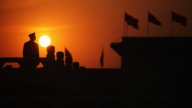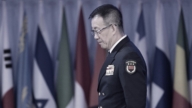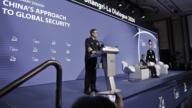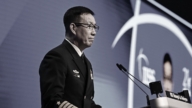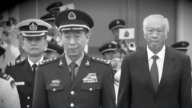【新唐人2012年6月7日讯】有消息说,即将于今年下半年召开的中共十八大,由于军队的高层、军方代表,还有众多将领期望能够分享政治局常委名额,并获得更多委员名额,而出现了新的不稳定因素。
消息说,几大军区负责人、四兵种和四大部负责人,期望本届全代会可以给军方一个政治局常委名额,和数个委员名额。有的将领甚至提出,如果本届全代会还是选出9名常委,军方应该占2个名额。而政治局委员,军方应占5个名额。将领们的普遍意见认为,军方占1个常委名额、3个委员名额较为现实,其中,1个委员名额应该给武警部队。
中共一向强调“党指挥枪”,只有抓住军权,才能抓住党权和政权。中共在1949年建政后,军委主席一职始终都是党的第一把手(如:毛泽东、华国锋、江泽民),或者是实际上的第一把手(如:邓小平)兼任。在这次由薄熙来下台而引发中共前所未有的内斗中,胡锦涛也是牢牢抓住军队,再三强调要军队“听从党中央指挥”。
中共对“枪杆子”另一种形式的掌控,也表现在限制军方在政权高层的名额。自90年代以来,除刘华清因89年镇压六四学潮担任过短暂的5年常委之外,军方高层只在政治局委员里面占两个名额。十七大政治局委员现任25人中,军方仅有郭伯雄和徐才厚,排名还都在20名之后。政治局常委没有军队的份。武警部队连政治局委员的名额都没有。
时事评论家横河认为,在正常国家,不存在任何一个政党凌驾于政府之上,因此军队也不需要进入任何党的机构争权,但是中共一直不允许民选政府,实行一党独裁。
横河:“共产党本身就是权力过大,所以军队要求在党内有更多的发言权,这个要求实际上一直是有的。如果说他们今年真的提出这个要求,而且很强烈的话,那只能说明中共现在对军队的依赖性越来越强,就说明它的统治能力越来越低。”
《博讯网》报导说,军方高层这次呼声较往届明显强烈,如果这次全代会没有尊重军方意见,军方名额依然如故,恐会导致军方强烈不满,而造成政权不稳。
目前胡,温正和掌握着武警公安体系的政法委书记周永康两派对峙,此刻军方的支持可以说至关重要,军方提出“入常”是否可能因此而获得胡、温,或是习近平的支持呢?
美国“乔治梅森大学”客座教授章天亮认为,胡锦涛和习近平都属于文官,因此在允许军方高层入常的考量上可能趋于保守。
章天亮:“如果说十八大之后,有一个军队的人进常委的话,对于习近平来说就是一个非常大的威胁。因为,习近平并不是一个强权人物,中共内部的话,这种都是凭实力说话的,就是包括权力之间的争夺。那习近平他本身又没有一个军方的背景,他是控制不了军队的人的。”
如果这次军方高层真能占据1到2个常委名额,对今后的局势会产生什么影响?
章天亮分析,军方的意见和政治局常委级别的意见经常不一致,这从中共近期和周边国家发生问题时,军方的发声可以看出。
章天亮:“如果一旦军方人进入政治局常委之后,那么共产党的分裂几乎是肯定的。或者是中国就变成军人独裁,就是谁实力大谁就能够独裁,或者,它会带来共产党的进一步分裂。”
横河认为,军方如果入常,甚至可能对周边国家也带来影响。
横河:“常委和政治局里面如果过多的军人进去以后,实际上只能反映,这个党的执政能力下降,或者是它的危机加重。而且,军队本来就是一个暴力集团,就是一个武装集团,所以它更有可能对内的暴力镇压,对外的发动战争,这些可能性都会增大。”
近来,消息人士向海外媒体透露,十八大常委将由9人变为7人,也就是废掉江泽民在十六大退位时,为了控权增加的“政法委”与“文宣”两名常委。“人数的减少”意味着“权力的集中”,军方在此时提出向文官“分权”,将会对十八大产生什么样的影响,还有待观察。
采访/梁欣 编辑/尚燕 后制/黎安安
Will the military make it into the 18th National Congress?
It is said that due to high military officials, representatives,
and generals expecting to share seats in Politburo Standing Committee
in order to get more seats in the Central Committee,
new instability has emerged for the upcoming 18th National Congress of the CCP.
It is said that commanders in charge of several major military
regions, four arms, and four headquarters expect
the military will gain a seat in the Politburo Standing
Committee, and several seats in the Central Committee.
Some generals even suggested that if the Standing Committee
remains at nine this year, the military should occupy two seats.
Military should also take five seats in the Central Committee.
The military in general believes that it’s practical for armed
forces to take one seat in the Standing Committee, and three seats in Central Committee.
Meanwhile, one Central Committee seat should be given
to the Armed Police Force.
The CCP has always stressed that the “Party commands
the gun."
Only by seizing military power will the party power
and political power be seized.
After the CCP established its regime in 1949, the post
of Central Military Commission (CMC) chairman has always been the party’s leader
such as Mao Zedong, Hua Guofeng, Jiang Zemin,
or concurrently run by the governmental leader, such as Deng Xiaoping.
With the unprecedented infighting triggered by the fall of
Bo Xilai, Hu Jintao has a firm grasp of the army and
has repeatedly stressed that
the army “obey the command of the central CCP."
CCP also controls the armed forces via limiting military seats
in the regime.
Since the 1990s, Liu Huaqing was the only military official
who served the Standing Committee for a brief five years
because of the repression of June 4 student protests in 1989;
the senior military only accounted for two seats in the Politburo Central Committee.
Among the current 25 member Central Committee,
only Guo Boxiong and Xu Caihou are from the military with the ranking behind 20.
There is no military personnel in
the Politburo Standing Committee.
Armed Police Forces have no seats
in the Politburo Central Committee.
Commentator Hen He indicates that in a normal country,
no individual party is above the government, and there’s no
need for the military to enter a party’s organization.
But the CCP would not allow a democratically elected
government, and has implemented the one-party dictatorship.
Hen He:"The Communist Party itself has too much power
and therefore, the armed forces demand a greater say in the party, this request has always existed.
If they really made this request strongly this year, it only shows
that the CCP is now becoming increasingly dependent on the army and its ability to govern is decreasing."
The Boxun Network reported that the senior military voices
this time were significantly strong compared to previous years.
If this National Congress session shows no respect
for the opinions of military and leaves the same quota
for the military, it might lead to strong dissatisfaction
in the military and cause instability in the regime.
During the confrontation between Hu-Wen and Zhou Yongkang
who control the Armed Police and Politics and Law Committee.
Thus, military support at the moment is essential.
Will Hu-Wen or Xi Jinping support the military’s proposal
to enter the Standing Committee?
George Mason University Visiting Professor Zhang Tianliang
believes that Hu Jintao and Xi Jinping are both at the civil service,
and therefore may be more conservative in considering
a Standing Committee seat to the military.
Zhang Tianliang: “An army personnel entering the Standing
Committee after the 18th National Congress will be a big threat to Xi Jinping.
Xi Jinping is not a powerful figure.
Within the Communist Party, power speaks, even during
the power struggle.
Xi Jinping does not have a military background,
and he won’t be able to control the army."
If the senior military can really occupy one or two Standing
Committee seats, what affect would it have on the future?
。
Zhang Tianliang analyzes that the military and
the Politburo Standing Committee often hold different views.
The military opinion showed itself during recent interactions
between the CCP and the neighboring countries.
Zhang Tianliang: “Once the military enters the Politburo
Standing Committee, a split in the CCP is almost certain.
Maybe China will become a military dictatorship,
whichever holds more power will dictate.
Or it will bring further division in the Communist Party."
Hen He believes that a military Standing Committee
may even affect neighboring countries.
Hen He: “Too many military members in the Standing
Committee and Political Bureau only,
in fact, reflects the decreased capability of the party
and the aggravated crisis.
The army has always been a violent group, an armed group,
so it is possible for more domestic violence, repression,
plus war against foreign countries. These possibilities will increase."
Recently, sources disclosed to the foreign media that the 18th
National Congress Standing Committee will drop to seven from nine people.
That is to abolish the two Standing Committee seats elected
from “Political Committee" and “propaganda"
which were added to secure Jiang Zemin’s power
when he abdicated at the 16th National Congress.
A decrease in the number of seats means the concentration
of power.
The impact of military’s request of “decentralization"
at the 18th National Congress remains to be seen.


